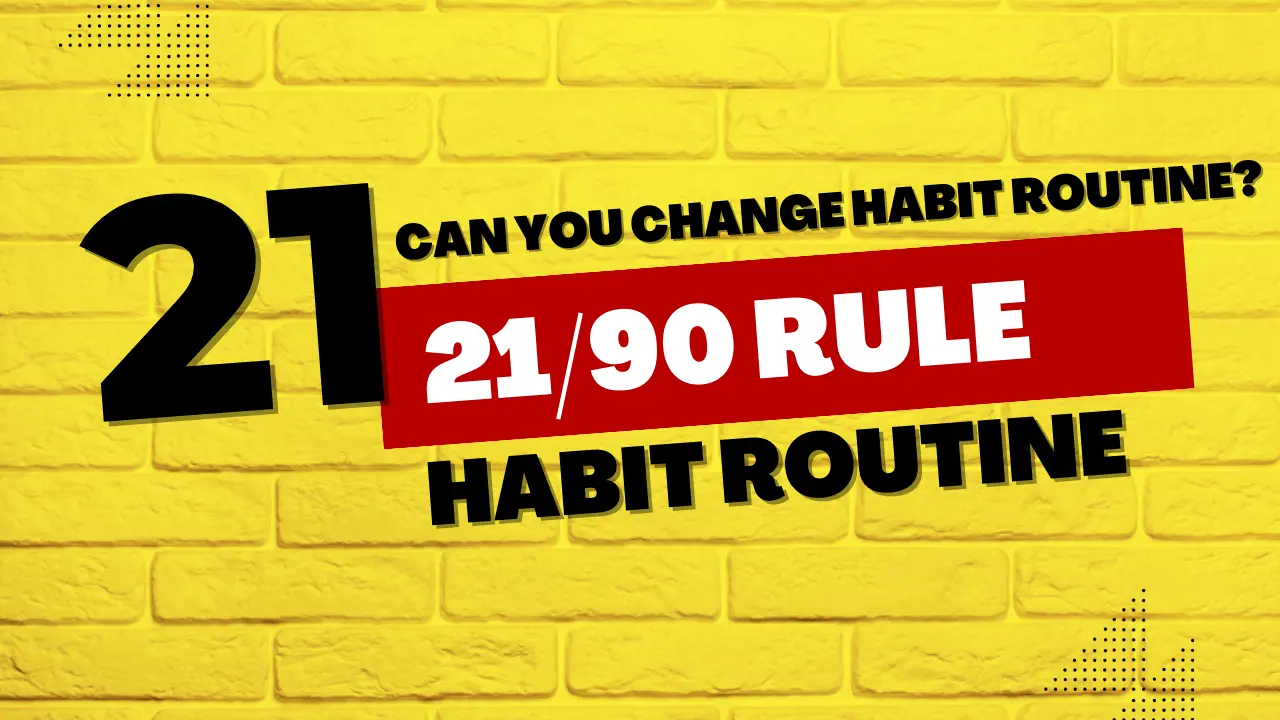
Make your ideal existence with life-changing habits. It is observed that it takes 21 days to adapt to another new habit by any individual. So it`s an ideal measure of time to change or present a genuinely new thing in your life. Pick the best test for you (or make your own) and do it for 21 days and you will perceive the way the habit turns out to be important for your way of life step by step.
We as a whole need to make beneficial routines, whether it`s good to go, in our leisure activities, or in our own lives. One famous strategy to assemble habits is known as the 21/90 rule. The standard is adequately basic.
Focus on an individual or expert objective for 21 straight days. Following three weeks, the quest for that objective ought to have turned into a habit. Whenever you`ve laid out that habit, you keep on doing it for an additional ninety days. In the event that you can save up something for quite a long time and afterward ninety days, then it ought to turn into an extremely durable way of life change.
Now that we`ve laid out what the 21/90 rule is, would it be that you ought to involve in it? While flossing consistently may be a pleasant objective, you really want to do one thing each day that works on your personal satisfaction in a significant manner. It should be something explicit that should be possible every day regardless of where you are. Here are a few possible objectives to seek after with the 21/90 rule.
1. How to form a new habit in 21 days?
In view of my experience, I`m leaned to say OK. It requires around 21 days to shape another habit.
However, a new report has depicted the multi-day hait development recipe as a fantasy. As indicated by Phillippa Lally; a well-being brain science specialist at College School London, another habit for the most part requires somewhat more than 2 months — 66 days to be definite — and however much 254 days until it`s full-fledged.
The review depended on the way of behaving of 96 members who were approached to pick a habit and practice it for quite some time. The members answered the specialist how programmed their new conduct felt after some time. Without a doubt, the outcomes shifted definitely starting with one individual and then onto the next driving the specialist to guarantee that automaticity i.e how programmed the new conduct felt after some time takes between three to quite a bit longer than 21 days.
This news sent shock waves across the self-improvement local area driving each self-improvement blogger to withdraw every one of their cases about the multi-day recipe and to acknowledge the discoveries of this exploration.
2. Adapting to a new habit in 21 days required will power
Gaining another habit, no doubt, is definitely not everyone`s cup of tea. A great many people battle with shaping and keeping new habits. They lose inspiration over the long run and in the process wind up off course.
Try to answer this:-
- How often have your attempted to become easier and failed?
- How often have you attempted to keep your inbox clean from garbage and different messages?
- How often have you attempted to focus on a day-to-day 20-moment and not adhered to it?
So it appears as though there is some sense in accepting that the habit development venture is long and difficult and that it could take significantly longer than 21 days.
In any case, I additionally feel that we shouldn`t fail to focus on individuals who figured out how to beat uncommon chances in moderately brief timeframes. In some cases, it can take an individual one significant second to quit smoking or drinking and gain moderation. It can take an individual one case to choose to compose consistently lastly wrap up composing his/her book. It can likewise take an individual one glimmer of one moment to choose to eat good food and get thinner.
- For what reason would we confirm or deny that we are attempting to gain from these individuals rather than the people who partook in the examination?
- For what reason are these bloggers surrendering to the discoveries of exploration?
- Why has the normal individual`s experience become our norm for what`s possible?
- Shouldn`t this multitude of self-awareness bloggers be quick to fundamentally do their own discoveries?
3. Strategy for habit Formation
I made the decision to approach my 21-day mission to create a new habit as a slow work in progress at this point. Every day, I set out to do something simple yet consistent to create a habit.
For me, it was crucial to select a task that I could complete every day without encountering too much difficulty. I made a little beginning. And after I mastered that, I decided to increase the difficulty a little bit and tackle something harder. I made the decision to do that every day after that.
Therefore, start by jogging for 10 minutes on the first day (and do limit yourself if you feel like running more), then run for 11 minutes the next day, 12 minutes the next day, etc., rather than promising yourself to run on the treadmill for 30 minutes each day for 21 days. You will be able to run for a little over 30 minutes after 21 days. You will be able to run for an hour in two months thanks to this one-minute increase.
4. Day-wise action plan for 21 days
Day 1 to Day 4
Your motivation is at its highest point at this point. You go above and above to exercise your habit on those days. At this point, your favorite thing in the entire world is your habit. It becomes more difficult at this point.
Day 5 to Day 10
The typical time to stop is 5 to 10 days. Your mind will give attention to other things rather than achieving your goal. From day 5 through ten, your aim is to use imagery to support your goals. Once you`ve been practicing your habit for ten days, it will be easier to keep up.
Day 11 to Day 15
At this point, don`t let up on the accelerator. You have to keep track of how your day and body have changed on these days. Begin a workout or engage in public discussion or a habit about it. Halfway through, you are done. A little party is being held here.
Day 16 to Day 20
Decide to continue daily and note how many days are remaining till you complete your course. Each day you cross off will give you a great sense of accomplishment over how far you`ve come. The final third of the course is now.
Day 21 and afterward
Your habit should now be a regular part of your schedule. From this point on, your attention should be on the long-term advantages of continuing this practice as part of your daily routine and what advancements you can achieve if you do so.
In order to alter your routine over the course of 21 days, consider the following suggestions:
- Define your objective: Be specific about the habit you want to break and make sure it is something that you can actually do.
- Begin small: Try not to make every change at once. Start by making small, simple changes to one or two bad habits that you want to focus on.
- Plan ahead: Set specific daily objectives and a plan for how you will change your habit in writing. For instance, if you want to get more active, you could set a goal of walking for 15 minutes every day for the first week.
- Monitor your progress: Use a journal or an app to keep track of your progress and success. You`ll be able to see how far you`ve come and stay motivated by this.
- Find assistance: You can get support from friends and family by changing your habits. You can also find a mentor who has successfully implemented the same change or joined a support group.
- Keep your attitude upbeat: Celebrate your successes as you develop your new habit by concentrating on its advantages. If you experience a setback, don`t beat yourself up; simply get back on track and keep moving forward.
Keep in mind that breaking a habit takes time and effort, so be patient with yourself and kind to yourself. You can make lasting changes to improve your life with dedication and perseverance.
